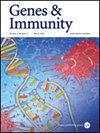缺氧诱导的胰腺癌自噬通过抑制MHC-I的表达来抵消CD8+ T细胞的细胞毒性。
IF 4.5
3区 医学
Q1 GENETICS & HEREDITY
引用次数: 0
摘要
低氧微环境是实体瘤的基本特征。自噬在免疫调节中的作用一直存在争议。本项目旨在阐明特定条件下(缺氧)胰腺癌(PC)自噬对CD8+ T细胞的影响及其调控机制。western blot (WB)和免疫荧光(IF)检测小鼠HIF1α和自噬水平。用KC7F2 (HIF-1通道抑制剂)或氯喹(自噬抑制剂)在常氧或缺氧条件下评估HIF1α对细胞自噬的影响。CD8+ T细胞与PC细胞共培养,乳酸脱氢酶(LDH)和Hoechst/PI染色评价细胞毒性。采用酶联免疫吸附法(ELISA)和流式细胞术检测细胞因子含量和CD8+ T细胞活化水平。采用定量逆转录聚合酶链反应(qRT-PCR)、WB、IF和流式细胞术分析PC细胞(膜)中MHC-I的表达。采用人源化免疫重组小鼠,研究hif α-诱导的自噬对体内免疫的影响。当细胞处于缺氧状态时,HIF1α水平和自噬水平均高于常氧状态。用KC7F2处理后,HIF1α和自噬水平与常氧状态相似。氯喹治疗使自噬水平逆转到常氧状态。转染e- hif1 α后的PC细胞自噬水平升高,细胞(膜)上MHC-I表达降低,从而削弱了CD8+ T细胞的细胞毒性,从而降低了与CD8+ T细胞共培养时被CD8+ T细胞识别和攻击的概率。在小鼠中,HIF1α的过表达阻碍了CD8+ T细胞的免疫抑制功能,并通过减少MHC-I抗原呈递促进PC的免疫逃逸。缺氧条件下,hif α-诱导的自噬通过抑制MHC-I的表达来降低CD8+ T细胞的细胞毒性。本文章由计算机程序翻译,如有差异,请以英文原文为准。

Hypoxia-induced autophagy in pancreatic cancer counteracts the cytotoxicity of CD8+ T cells by inhibiting the expression of MHC-I
The hypoxic microenvironment is an essential feature of solid tumors. Autophagy has been controversial in its role in immune regulation. This project aims to elucidate the impact of autophagy in pancreatic cancer (PC) under specific conditions (hypoxia) on CD8+ T cells and the regulatory mechanisms behind it.The levels of HIF1α and autophagy were analyzed by western blot (WB) and immunofluorescence (IF). The effects of HIF1α on cell autophagy were assessed in normoxic or hypoxic treatments using KC7F2 (HIF-1 channel inhibitor) or chloroquine (autophagy inhibitor). CD8+ T cells were co-cultured with PC cells to assess the cytotoxicity using lactate dehydrogenase (LDH) and Hoechst/PI staining. The content of cytokines and the activation level of CD8+ T cells were measured by enzyme-linked immunosorbent assay (ELISA) and flow cytometry. MHC-I expression in PC cells (membranes) was analyzed using quantitative reverse transcription polymerase chain reaction (qRT-PCR), WB, IF, and flow cytometry. Humanized immune-reconstituted mice were applied to investigate the impact of HIF1α-induced autophagy on in vivo immunity.When cells were in hypoxia, the levels of HIF1α and autophagy were higher compared to normoxic conditions. Treatment with KC7F2 resulted in similar levels of HIF1α and autophagy as those in normoxic state. Chloroquine treatment reversed the autophagy level to the normoxic state. The autophagy level of PC cells transfected with oe-HIF1α was increased, with reduced MHC-I expression on cells (membranes), which impaired the cytotoxicity of CD8+ T cells, and thus decreasing the probability of recognition and attack by CD8+ T cells when co-cultured with them. In mice, overexpression of HIF1α hindered the immune suppressive function of CD8+ T cells and facilitated the immune escape of PC by reducing antigen presentation of MHC-I.Under hypoxia, HIF1α-induced autophagy reduces the cytotoxicity of CD8+ T cells by repressing MHC-I expression.
求助全文
通过发布文献求助,成功后即可免费获取论文全文。
去求助
来源期刊

Genes and immunity
医学-免疫学
CiteScore
8.90
自引率
4.00%
发文量
28
审稿时长
6-12 weeks
期刊介绍:
Genes & Immunity emphasizes studies investigating how genetic, genomic and functional variations affect immune cells and the immune system, and associated processes in the regulation of health and disease. It further highlights articles on the transcriptional and posttranslational control of gene products involved in signaling pathways regulating immune cells, and protective and destructive immune responses.
 求助内容:
求助内容: 应助结果提醒方式:
应助结果提醒方式:


